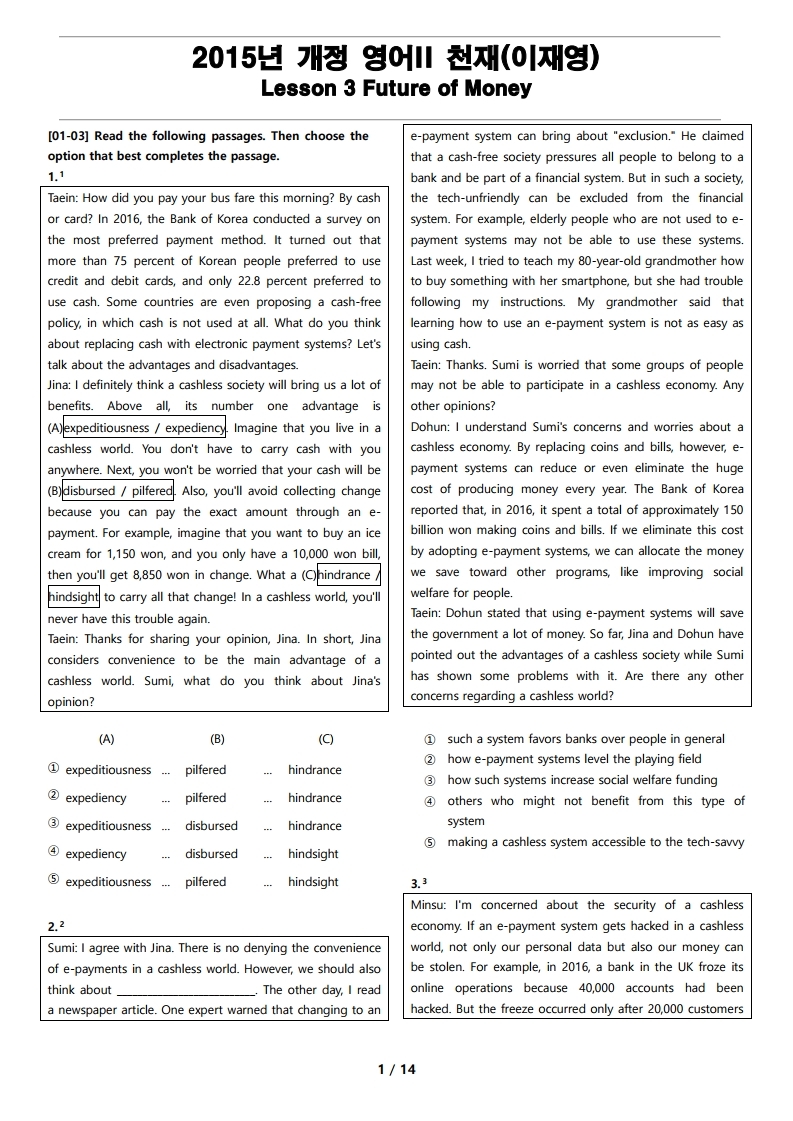2015년 개정 영어 II 천재(이재영)
3과 변형 문제
Future of Money

일반 워크북 형태의 문제에서 벗어나 The Makings가 만든
2015년 개정 영어 II 천재(이재영) 3과 변형 문제는
출판사에서 오랫동안 영어 번역과 교정을 하셨던 원어민 선생님과
현직에서 강사를 하고 있는 연구진들이 학생들을 위한 최상의
2015년 개정 영어 II 천재(이재영) 3과 변형 문제를 선보입니다.
사고력과 이해력을 요구하는 문제들로 내신 대비 뿐만이 아니라
수능도 한꺼번에 공부하실 수 있는 자료입니다.
중간고사&기말고사 전에 더메이킹스(The Makings)에서
제작한 2015년 개정 영어 II 천재(이재영) 3과 변형 문제로 마무리 하세요.
정답 확인하러가기!
https://themakings.co.kr/57/?idx=657
themakings.co.kr

대표사진 삭제링크
2015년 개정 영어 II 천재(이재영) 3과 변형 문제 Future of Money
The Makings의 2015년 개정 영어 II 천재(이재영) 3과 최종 모의고사는
총 10개의 유형으로 구성되어 있습니다.
1. 빈칸 채우기(객관식)
2. 글의 내용 일치/불일치(객관식/한글 선택지)
3. 글의 내용 일치/불일치(객관식/영어 선택지)
4. 글 끼어 넣기(객관식)
5. 어법(서술형)
6. 어휘(서술형)
7. 주제문(객관식/영어 선택지)
8. 어휘 빈칸 채우기(서술형)
9. 영작(서술형)
10. 요약문 완성하기(서술형)
더메이킹스(The Makings)가 제작한
2015년 개정 영어 II 천재(이재영) 3과 변형 문제의 지문입니다.
1번 지문
Taein: How did you pay your bus fare this morning? By cash or card? In 2016, the Bank of Korea conducted a survey on the most preferred payment method. It turned out that more than 75 percent of Korean people preferred to use credit and debit cards, and only 22.8 percent preferred to use cash. Some countries are even proposing a cash-free policy, in which cash is not used at all. What do you think about replacing cash with electronic payment systems? Let's talk about the advantages and disadvantages.
Jina: I definitely think a cashless society will bring us a lot of benefits. Above all, its number one advantage is convenience. Imagine that you live in a cashless world. You don't have to carry cash with you anywhere. Next, you won't be worried that your cash will be stolen. Also, you'll avoid collecting change because you can pay the exact amount through an e-payment. For example, imagine that you want to buy an ice cream for 1,150 won, and you only have a 10,000 won bill, then you'll get 8,850 won in change. What a burden to carry all that change! In a cashless world, you'll never have this trouble again.
Taein: Thanks for sharing your opinion, Jina. In short, Jina considers convenience to be the main advantage of a cashless world. Sumi, what do you think about Jina's opinion?
2번 지문
umi: I agree with Jina. There is no denying the convenience of e-payments in a cashless world. However, we should also think about others who might not benefit from this type of system. The other day, I read a newspaper article. One expert warned that changing to an e-payment system can bring about "exclusion." He claimed that a cash-free society pressures all people to belong to a bank and be part of a financial system. But in such a society, the tech-unfriendly can be excluded from the financial system. For example, elderly people who are not used to e-payment systems may not be able to use these systems. Last week, I tried to teach my 80-year-old grandmother how to buy something with her smartphone, but she had trouble following my instructions. My grandmother said that learning how to use an e-payment system is not as easy as using cash.
Taein: Thanks. Sumi is worried that some groups of people may not be able to participate in a cashless economy. Any other opinions?
Dohun: I understand Sumi's concerns and worries about a cashless economy. By replacing coins and bills, however, e-payment systems can reduce or even eliminate the huge cost of producing money every year. The Bank of Korea reported that, in 2016, it spent a total of approximately 150 billion won making coins and bills. If we eliminate this cost by adopting e-payment systems, we can allocate the money we save toward other programs, like improving social welfare for people.
Taein: Dohun stated that using e-payment systems will save the government a lot of money. So far, Jina and Dohun have pointed out the advantages of a cashless society while Sumi has shown some problems with it. Are there any other concerns regarding a cashless world?
3번 지문
Minsu: I'm concerned about the security of a cashless economy. If an e-payment system gets hacked in a cashless world, not only our personal data but also our money can be stolen. For example, in 2016, a bank in the UK froze its online operations because 40,000 accounts had been hacked. But the freeze occurred only after 20,000 customers had lost money from their accounts. Back in 2013, a criminal group penetrated more than 100 banks' internal computers. They transferred millions of dollars from banks in Russia, Japan, Switzerland, the United States, and the Netherlands into dummy accounts set up in other countries.
Taein: That's a good point. Thanks, Minsu. Now, we must conclude today's discussion about the pros and cons of a cashless society. Some of you mentioned that a cashless economy will provide convenience and cost-savings, but others raised concerns about difficulties for tech-unfriendly people and the lack of security. In addition to these, there may be other advantages and disadvantages to a cashless society. What is your opinion? I hope that today's discussion has made you more aware of the positive and negative aspects of living in a cashless society.
'2015년 개정 영어 II > 천재(이재영)' 카테고리의 다른 글
| 2015년 개정 영어 II 천재(이재영)6과 변형 문제 Reach Beyond Ourselves (0) | 2023.10.12 |
|---|---|
| 2015년 개정 영어 II 천재(이재영)5과 변형 문제 ICT In Our Lives (0) | 2023.08.17 |
| 2015년 개정 영어 II 천재(이재영)4과 변형 문제 Bring Literature Into Your Life (0) | 2023.08.15 |
| 2015년 개정 영어 II 천재(이재영)2과 변형 문제Discover Cultures Around the World (0) | 2021.08.12 |
| 2015년 개정 영어 II 천재(이재영) 1과 변형 문제 (0) | 2020.05.11 |